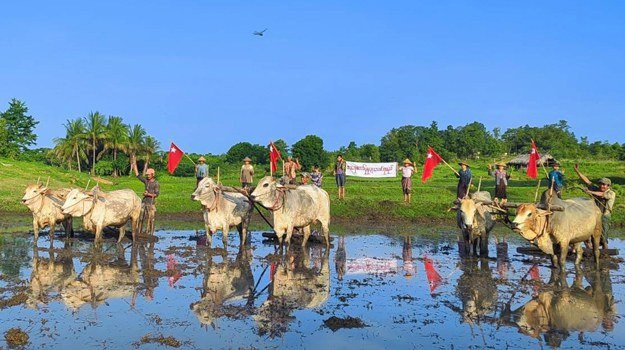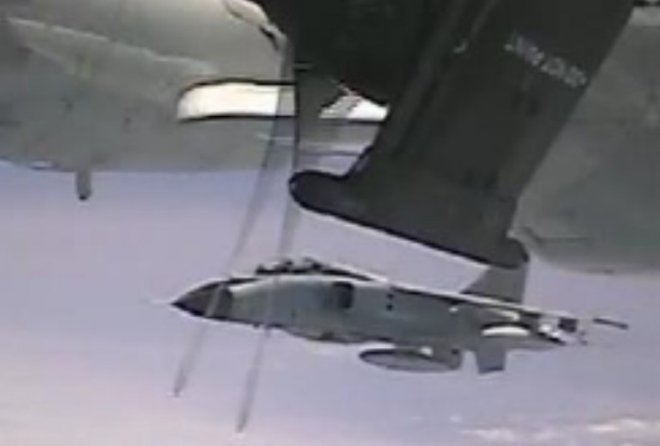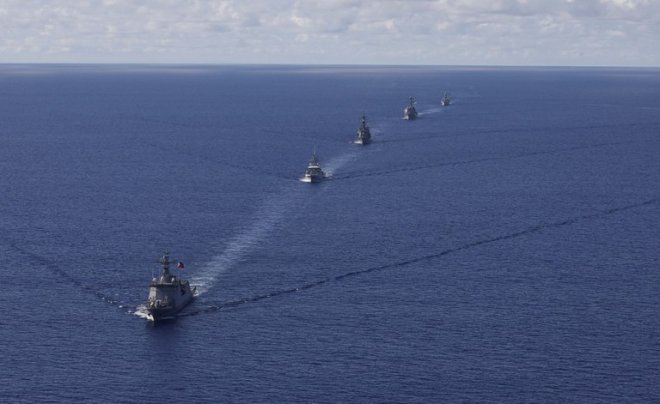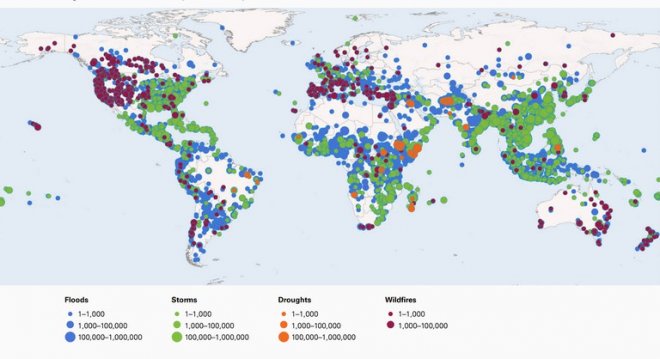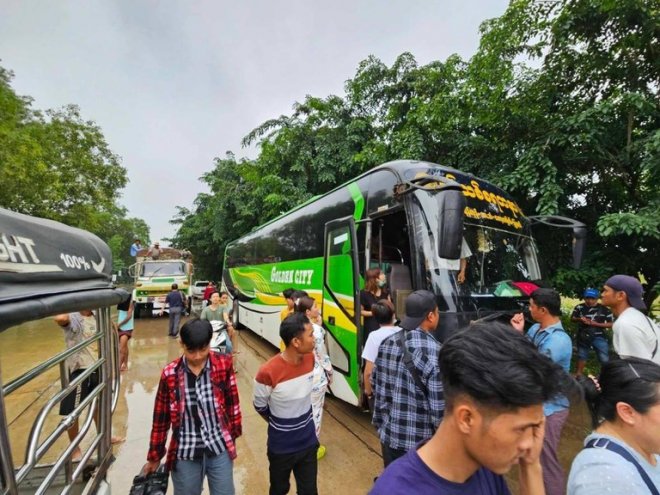Indonesia sends warships to monitor Chinese coast guard vessel
Indonesian officials say they’re not worried about the presence of China’s largest coast guard ship in the Natuna Sea.Jakarta has sent naval ships and a patrol aircraft to the area to monitor the Chinese vessel’s movements but the Navy’s Chief, Adm. Muhammad Ali, said everything is “under control.”
Vietnamese analysts, however, are concerned the Chinese vessel’s presence may signal a prolonged stand-off in the newly demarcated maritime boundaries.
Last month, Vietnam and Indonesia concluded talks on the boundaries of their exclusive economic zones (EEZs), which also lie within the imaginary “nine-dash line” that Beijing uses to demarcate what it calls its “historical rights” over almost 90% of the South China Sea.
An EEZ gives a state exclusive access to the natural resources in the waters and seabed.
Hanoi and Jakarta have not disclosed details of the agreement and China has not protested officially but Beijing’s largest coast guard ship has been in the area between Vietnam and Indonesia since Dec. 30.
The CCG 5901, also the world’s largest coast guard vessel, was still in the area on Tuesday, according to ship tracker Marine Traffic.
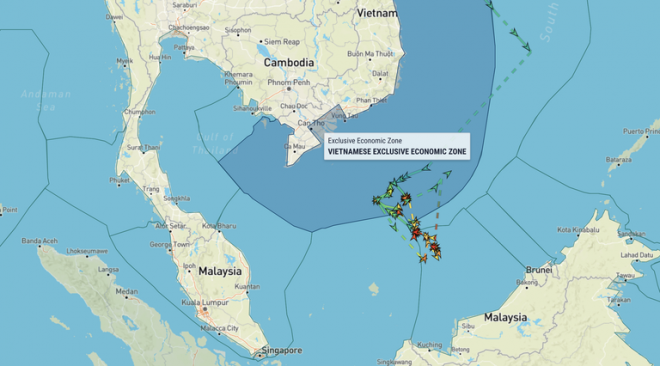 Past track of China’s CCG 5901, the world’s largest coast guard vessel, from Dec. 29-Jan. 17, 2022. Credit: MarineTraffic
Past track of China’s CCG 5901, the world’s largest coast guard vessel, from Dec. 29-Jan. 17, 2022. Credit: MarineTraffic‘There are no problems’
An unnamed Chinese embassy official told Indonesian media outlet Tempo.co the Chinese ship was in the area “under Chinese jurisdiction, according to international law.”
A U.N. tribunal in 2016 invalidated the “nine-dash line” but Beijing has so far rejected the ruling, insisting that China has jurisdiction over all areas within the line.
"It"s for the purpose of maritime security and order," the official was quoted as saying.
In response, Adm. Muhammad Ali told RFA-affiliated news service BenarNews Tuesday “we have at least three to four warships in Natuna on the ready and one marine patrol aircraft.”
Ali added the Indonesian Air Force’s drones would also be deployed “for joint patrols in the North Natuna Sea.”
“There are no problems,” the Navy Chief reiterated.
Satya Pratama, a senior Indonesian government official and a former captain at Indonesia’s Maritime Security Agency Bakamla, said the presence of warships in the area is “not abnormal.”
“The Indonesian Navy regularly patrols the area so I don’t think the fact that the ships are there alone will escalate the tension,” Pratama told RFA.
“It happened before. It is just parties sending messages,” he said, adding that “nobody would want additional tension in the area” where the Indonesian government has just passed an oil and gas development plan.
Earlier this month, Indonesia’s Upstream Oil and Gas Regulatory Task Force (SKK Migas) approved the plan to develop the Tuna oil and gas field, also known as the Tuna Block, in the North Natuna area.
The Tuna Block lies entirely inside Indonesia’s EEZ and just 13 kilometers (8 miles) from the border of the Vietnamese EEZ but the area is frequented by Chinese law enforcement and fishing vessels.
Vietnam’s concerns
Indonesia, Vietnam and Malaysia have all accused China of disrupting their oil and gas exploration activities with frequent incursions by Chinese coast guard and maritime militia ships, leading to confrontations.
Vietnamese analysts said the deployment of the CCG 5901, dubbed the “monster” vessel and armed with heavy machine guns, may be China’s response to the Vietnam-Indonesia maritime limitation agreement.
Le Hong Hiep, Senior Fellow at the ISEAS - Yusof Ishak Institute in Singapore, said the Chinese coast guard ship’s operating area is “very close to the supposed boundary between Vietnam and Indonesia,” and it is an indication of China’s protest.
Viet Hoang, another well-known Vietnamese analyst and university lecturer, said he fears this may signal a “prolonged stand-off in the area.”
“China will not let it [the Vietnam-Indonesia agreement] go easily,” he said.
In 2021, Chinese survey ships and coast guard vessels loitered uninvited for almost a month in the North Natuna area, where Indonesia’s oil and gas exploration was underway.
 Vanguard Bank is located within Vietnam’s EEZ. Credit: Google Maps
Vanguard Bank is located within Vietnam’s EEZ. Credit: Google MapsVan Pham, who runs an independent research project focusing on the South China Sea, points to another area of Vietnam’s concerns – the Vanguard Bank.
The bank is an entirely submerged feature that hosts three Vietnamese outposts, located within Vietnam’s EEZ and about 400 kilometers (249 miles) from Indonesia’s Riau Island, north of the Natuna Sea.
“Chinese coast guard ships are known to be present at a very regular frequency around the Vanguard Bank, from where they monitor and from time to time harass Vietnam’s oil exploration activities nearby,” said the chief administrator of the South China Sea Chronicle Initiative.
The Vanguard Bank is a known South China Sea flashpoint between Vietnam and China.
In July 2019, a Chinese Coast Guard contingent accompanied a Chinese survey vessel operating within Vietnam’s waters around the bank, causing diplomatic outcry and a tense, months-long standoff between the Vietnamese and Chinese coastguards.
Tria Dianti in Jakarta contributed to the report.
BenarNews is an RFA-affiliated news service.
[圖擷取自網路,如有疑問請私訊]
|
本篇 |
不想錯過? 請追蹤FB專頁! |
| 喜歡這篇嗎?快分享吧! |
相關文章
AsianNewsCast








